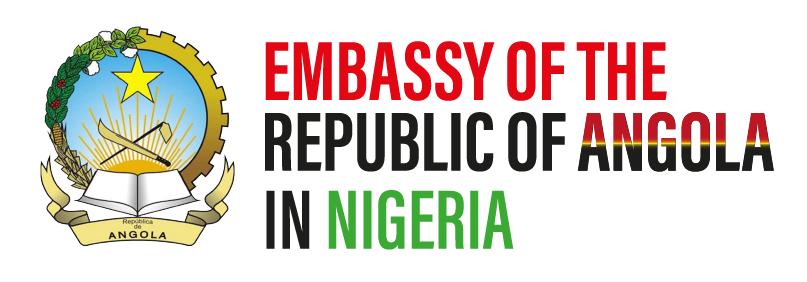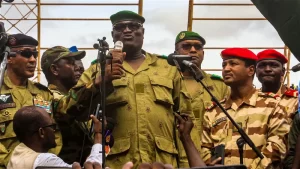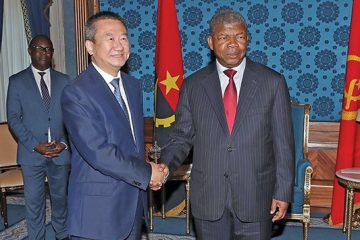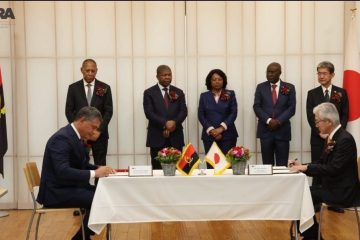…Junta warns against foreign intervention
…Talks between ECOWAS, Niger’s junta yield little result —Official
..Says deep divisions exist within the presidential guard
…Notes majority of soldiers at presidential complex’ll flee if ECOWAS attacks
…Pope calls for peace in coup-hit Niger
The Economic Community of West African States, ECOWAS, has rejected the three-year transition plan proposed by Niger Republic’s military junta.
It will be recalled that the coup leader, General Abdourahamane Tchiani, had at a meeting with ECOWAS delegation, led by General Abadulsalami Abubakar, retd, in Niamey on Saturday, promised the military government would return Niger Republic to democracy in three years.
Abdel-Fatau Musah, ECOWAS Commissioner for Political Affairs, Peace and Security, told BBC in an interview, yesterday, that the proposal was unacceptable to ECOWAS, setting the ground for a military operation.
Meanwhile, thousands of Nigeriens flooded the streets yesterday declaring support for the military junta.
Their demonstration came against the backdrop of ECOWAS’ insistence on invading the country to rout out coupists should diplomacy fail to restore ousted President Mohamed Bazoum to power.
The rally came on a day an official of the government in Niger said talks between the ECOWAS delegation, led by former Head of State, General Abdulsalami Abubakar, retd and the junta achieved very little result.
The official also noted that already, there are deep divisions within the presidential guard, which ousted President Bazoum, saying should ECOWAS launch an attack on Niger Republic, the majority of soldiers in the presidential complex would flee.
This is even as Pope Francis yesterday canvassed a diplomatic solution to the political crisis.
The demonstrators chanted slogans hostile to former colonial power, France and especially ECOWAS, which is considering a potential military operation to reinstate elected President Mohamed Bazoum if ongoing negotiations with coup leaders fail.
The Sahel state’s new military leaders have officially banned demonstrations but in practice, those in support of the coup are allowed to go ahead.
The demonstrators waved placards, saying “stop the military intervention” and “No, to sanctions”, in reference to the financial and trade restrictions imposed by ECOWAS, four days after the coup on July 26.
Yesterday’s pro-coup rally was accompanied by musicians praising the new military regime, according to AFP.
The latest in a string of pro-coup rallies came a day after the new military ruler in Niamey warned that an attack on Niger would not be a “walk in the park.”
‘No wish to confiscate power’
General Abdourahamane Tchiani also said in a televised address at the weekend that he did not wish to “confiscate” power and that a transition of power back to civilian rule will not go beyond three years.
Niger’s new leaders have accused France, a close Bazoum ally, of being behind the anti-coup stance taken by ECOWAS, which again at the weekend made a fresh push for a diplomatic solution.
According to AFP, after ECOWAS chiefs of staff met in the Ghanaian capital, Accra, on Friday, the 17-nation bloc said it had agreed on a date for a potential intervention but nonetheless sent a diplomatic delegation to Niamey at the weekend, led by General Abdulsalami Abubakar.
Niger television showed delegation members shaking hands with Bazoum, who remains in detention.
It also broadcast footage of Abubakar speaking to Tchiani but the content of the exchange had not been made public.
In his televised address on Saturday, Tchiani alleged that ECOWAS was “getting ready to attack Niger by setting up an occupying army in collaboration with a foreign army”, without saying which country he meant.
The coup leader, Tchiani, however, warned that the military and people of Niger would defend the country should ECOWAS go ahead with its invasion plan.
Talks between ECOWAS, Niger’s junta yield little, official tells Associated Press
However, an official in Niamey, Niger Republic’s capital, said on condition of anonymity yesterday that weekend’s two-hour meeting between Niger’s new military regime and a delegation from the West African regional bloc, ECOWAS, yielded very little result.
It was the first time head of the junta, Gen. Abdourahmane Tchiani, met with ECOWAS delegation after rebuffing previous attempts.
Saturday’s meeting was a last-ditch diplomacy scramble by ECOWAS to resolve the crisis peacefully and followed last week’s announcement that 11 of its 15 member states had agreed to intervene militarily if democratically-elected President Bazoum was not released from house arrest and reinstated.
The bloc’s three other countries under military rule following coups, Guinea, Mali and Burkina Faso, were not included.
The latter two had previously warned they would consider intervention in Niger an act of war.
The official noted that during the weekend talks, Tchiani pushed for the lifting of economic and travel sanctions imposed by ECOWAS after the coup, saying Niger’s population was suffering because of them.
‘’The junta said they were under pressure, at times striking a conciliatory tone and apologizing for past disrespect towards the bloc, while also defiantly standing by its decision to overthrow Bazoum and unequivocal about him not returning to power.
“Tchiani also repeatedly expressed concerns that its former colonial ruler France, which has some 1,500 troops in the country and had been providing training and conducting joint operations with Niger’s military, was actively planning an attack,” said the official.
According to the official, Niger was seen by many Western countries as the last democratic partner in the region they could work with to beat back a growing jihadi insurgency by militant groups linked with al-Qaeda and the Islamic State.
He noted that France, the United States and other European nations had poured hundreds of millions of dollars into shoring up Niger’s army, adding that the coup had been seen as a major setback.
He quoted Sahel experts as saying it was not surprising that nothing came from Saturday’s meeting as each party was trying to show they were open to discussions when chances of an agreement were slim.
“ECOWAS and the rest of the international community want to restore President Bazoum and the junta is not on this agenda.
“The next step will be military confrontation … What we don’t know is when this confrontation will take place, how it will go, and what the consequences will be,” the official quoted Seidik Abba, a Nigerien researcher and Sahel specialist and president of the International Centre for Reflection for Studies On the Sahel, a think tank based in Paris, as saying.
Shortly after the meetings Saturday, Tchiani went on state television and laid out a roadmap for the country, saying it would return to civilian rule within three years and that details for the plan would be decided within 30 days through a national dialogue set for immediate launch.
“I am convinced that we will find solutions to all the challenges we face and that we will work together to find a way out of the crisis, in the interests of all,” the official said.
However, Aneliese Bernard, former U.S. State Department official who specializes in African affairs and is now director of Strategic Stabilization Advisors, a risk advisory group, said the transitions for Niger’s multiple previous coups were shorter, stressing that a three-year timeline was unprecedented said .
“What we’re seeing in the region is the emergence of trends just to military rule,” she said.
But some Nigerien soldiers don’t think Tchiani will last three months, let alone several years.
A soldier, who worked directly with Bazoum before the coup, and did not want to be named for fear of his safety, told the AP on Saturday that there were deep divisions within the presidential guard, the unit that overthrew Bazoum.
The soldier noted that of the nearly 1,000 soldiers at the base on the presidential complex, majority of them would flee if ECOWAS attacked, adding that Tchiani would be overthrown in a few months.
According to Andrew Lebovich, a research fellow with the Clingendael Institute, Tchiani is widely unpopular in security circles within Niger and is seen as having reached his current post because of former President Mahamadou Issoufou’s patronage, rather than through his own connections and battlefield achievements,
“While the (junta) has presented a unified public face, it is a partnership of branches of the armed forces that have competed for status and resources in the recent past,” he said.
Pope calls for peace in coup-hit Niger
Meanwhile, Catholic Pontiff, Pope Francis 11, yesterday made case for a diplomatic solution to the political crisis in Niger Republic.
“I am following with concern what is happening in Niger, and join the bishops’ call in favour of peace in the country and stability in the Sahel.
“I join with prayer the efforts of the international community to find a peaceful solution as soon as possible for the good of everyone,” said said Pope Francis while addressing the faithful in St Peter’s Square after his Angelus prayer.
Recall that the coup leader in Niger Republic, General Tchiani, had said on Saturday in a televised address any attack on his country would not be a walk in the park, promising that any transition of power to democratic rule would not go beyond three years.
This is against the demand of ECOWAS which wants immediate restoration of democratic rule in the country, coupled with the reinstatement of ousted President Mohamed Bazoum to power.



